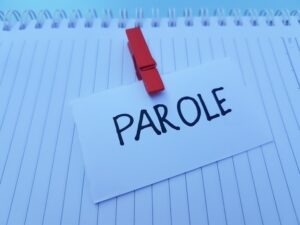
Sometimes, the court releases individuals on parole after a criminal conviction in California. Individuals have to obey certain rules of the court while on parole. Individuals who violate their parole can be taken into custody or arrested.
California Penal Code Section 3056: Awaiting Parole Revocation Hearings regulates custody while awaiting parole revocation hearings in California.
The court can revoke probation when individuals violate their probationary terms. Learn more about this California Penal Code here.
Understanding Parole in California
Parole allows individuals to get out of jail or prison without serving the full extent of their sentences in California. Individuals can sometimes get out on parole for “good behavior.” This allows them to exit the prison system or county jail under a conditional sentence and begin moving forward with their lives.
However, individuals are not free to do whatever they want while they are out on parole. They have to obey a number of regulations set down by the court. Parole conditions are not the same in every case. For example, the court may order an individual to:
- Continue living in a specific county or designated housing facility
- Register as a sex offender pursuant to a felony offense or a sex offense conviction
- Agree to submit to searches by police officers
- Avoid committing any new crimes or engaging in criminal activity
Individuals could also be required to meet with supervision agents or parole officers regularly. This may be a mandatory part of a post release community supervision program. Failing to adhere to court conditions can lead to a parole violation. Parole violations can then lead to an arrest pursuant to a violation of supervision, resulting in a revocation hearing or flash incarceration.
For a free legal consultation with a lawyer serving California, call (310) 896-2723
PC 3056 and Custody Before a Parole Revocation Hearing
The court will conduct a parole revocation hearing if someone is accused of violating their parole. However, this hearing will not take place immediately.
Often, there is a delay between the time the individual is arrested and the time the hearing begins. Custody for revocation during this period can be held in the county jail under PC 3056.
Generally, individuals are sent to county jail under PC 3056 regulations, though some may be housed in county facilities or transferred to a different county alternative or housing facility, particularly when intermediate sanctions are involved.
What if You Are a Minor?
Sometimes, individuals under the age of 18 are released on parole. If they violate their parole, they are not sent to county jail. Instead, they are taken to a juvenile detention facility, consistent with emergency language protocols.
Criminal Defense Lawyer Near Me (310) 896-2723
Immediate Consequences for Parole Violations
If you’re accused of violating your parole, the legal response can be immediate. Before your parole hearing, you may be taken into custody and held at the county jail until your hearing.
During the violation hearing process, law enforcement and the district attorney may assess your criminal history and determine whether a violent felony or lesser offense occurred.
What if You Didn’t Break Any Laws?
If you did not break any laws while allegedly violating your parole, your consequences are likely to be less severe.
You may return to prison for a period of flash incarceration or serve a defined period in jail—often up to one year—if you cannot contest the charges in your parole revocation hearing. You’ll need to plead your case with the Parole Board’s deputy commissioner, where reasonable doubt can play a crucial role.
Parolees accused of a new violation of law or serious criminal offenses while also violating parole face harsher consequences, including a prison sentence or additional jail time. Such cases may include a high-risk sex offender or criminal offenders with multiple felony convictions.
Click to contact our Understanding California’s Penal Code today
Common Parole Violations
The specificities of your parole should have been laid out for you during your initial parole hearing. Common violations of supervision pursuant to California law include:
- Violating a court-imposed curfew
- Leaving your home while under house arrest
- Failing to check in with a parole officer or supervision agent
- Testing positive for drug use or alcohol consumption without completing drug treatment or alcohol treatment
- Leaving a care facility or nonresidential substance abuse treatment program prematurely
A parole revocation may also follow any evidence of illegal search, criminal activity, or noncompliant offender activity. Defense attorneys may challenge these accusations and advocate for the supervised person.
Complete a Free Case Evaluation form now
Parole Revocation Hearings in California
Individuals accused of violating parole can face a parole revocation hearing under community supervision pursuant to California law. The prosecution must demonstrate probable cause that a violation of supervision occurred but is not required to prove guilt beyond a reasonable doubt.
During the hearing, a parole board reviews supervision agency reports, considers modifications of conditions or supervision with modifications, and weighs incentives for compliance. A criminal defense attorney can help introduce evidence, cross-examine witnesses, and interpret legal concepts.
The defendant, or person subject to supervision, may testify to contest the petition for revocation and any charges stemming from the revocation of supervision.
Results of a Parole Revocation Hearing in California
A parole board decides the outcome of a revocation petition, potentially finding that no violation occurred. If so, the person may resume their supervision under existing terms. However, if the board finds the parolee violated conditions, the board may:
- Revoke parole and order a period of incarceration
- Impose intermediate sanctions, such as house arrest or placement in a community corrections program
- Send the individual back to custody for revocation with a defined period of custody
Time under supervision can vary. While many spend three years on parole, individuals with determinate sentences or violent felonies may serve longer, even up to life sentences pursuant to California’s criminal justice policies.
How to Win a Parole Hearing
You can win your parole revocation hearing by successfully challenging the revocation petition. Criminal defense attorneys help collect and present evidence showing compliance with special conditions and the contents of supervision agency records.
Establishing an alibi, character witnesses, and records of treatment services or participation in a county alternative custody program may improve public safety returns and prevent additional time in prison.
Defense counsel may also introduce evidence from official sources, such as police station records or financial evaluation officers, to reduce risk classifications and argue for credit for time served.
This can influence public safety outcomes and reduce justice reinvestment strategy burdens on boards and criminal justice resources.
Ask a Lawyer About Custody While Awaiting a Parole Revocation Hearing
Are you or someone you know in custody while awaiting a parole revocation hearing? California Penal Code Section 3056: Awaiting Parole Revocation Hearings, as well as related provisions under California’s criminal justice spending statutes, determine where and how a person on probation or parole may be housed.
Simmrin Law Group can face the legal challenges of revocation hearings. Whether you’re dealing with a felony offense, awaiting a recognizance hearing, or seeking clarification on the minimum contents of a parole agreement, we’re here to help.
Call us today or complete a free case evaluation form to speak with a criminal defense attorney, then visit our FAQ page to learn more.
Call or text (310) 896-2723 or complete a Free Case Evaluation form

